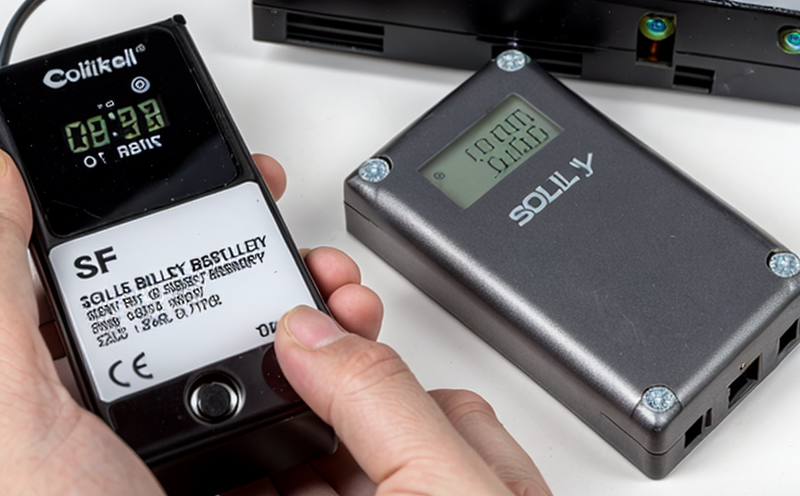UL 2271 Solid-State Battery Testing for Light Electric Vehicle Applications
The UL 2271 standard is a crucial benchmark for manufacturers of solid-state batteries intended for use in light electric vehicles (LEV). This standard ensures that these batteries meet rigorous safety requirements, which are essential to protect both the vehicle and its users. Solid-state batteries represent a significant step forward from traditional lithium-ion batteries due to their enhanced safety profile and performance characteristics.
UL 2271 addresses several key aspects of solid-state battery design and manufacturing processes that impact safety and performance in LEV applications. The standard encompasses testing procedures for evaluating thermal stability, mechanical integrity, and electrical performance under various conditions. These tests are performed on cells, modules, and batteries to ensure they meet stringent criteria before being incorporated into vehicles.
Thermal stability tests are critical because overheating can lead to catastrophic failures in solid-state batteries. The UL 2271 protocol includes controlled heating experiments that simulate real-world scenarios where excessive heat might occur due to overcharging or environmental factors. Mechanical integrity testing focuses on assessing how well the battery withstands physical stresses such as vibration, impact, and compression.
Electrical performance evaluations underpin the reliability of solid-state batteries by measuring their ability to maintain stable voltage and current outputs throughout their lifecycle. This includes evaluating internal resistance changes over time, which can indicate degradation or potential failure points within the cell structure. Compliance with UL 2271 signifies that a manufacturer has demonstrated adherence to these stringent safety measures.
Testing according to this standard is not only about compliance; it also fosters innovation by providing clear guidelines on what constitutes safe and effective solid-state battery technology for LEVs. By setting high bars for performance, durability, and safety, UL 2271 encourages advancements that could revolutionize the future of electric vehicles.
In summary, complying with UL 2271 ensures that manufacturers produce reliable, safe, and efficient batteries suitable for integration into light electric vehicles. This compliance not only meets regulatory requirements but also enhances market confidence through demonstrated adherence to recognized safety standards.
Why It Matters
The importance of UL 2271 cannot be overstated when considering the rapid growth and increasing demand for solid-state batteries in light electric vehicles. As consumers become more environmentally conscious, there is a growing need for safer, longer-lasting energy storage solutions that do not compromise on performance.
- Enhanced Safety: Traditional lithium-ion batteries have been known to catch fire or explode under certain conditions. Solid-state batteries mitigate these risks by using a solid electrolyte instead of liquid ones, making them inherently less flammable.
- Durability and Performance: These batteries offer superior cycle life and higher energy densities compared to conventional alternatives. This means they can last longer between charges while providing greater power output.
- Environmental Impact: By reducing the reliance on toxic chemicals used in traditional battery manufacturing, solid-state batteries contribute significantly towards minimizing environmental pollution.
The implementation of UL 2271 ensures that these advantages translate into practical benefits for consumers and businesses alike. It provides assurance that products meet stringent safety standards, thereby fostering trust among stakeholders involved in the development and deployment of LEVs equipped with solid-state batteries.
Eurolab Advantages
EuroLab stands out as a premier provider of UL 2271 testing services for solid-state battery manufacturers focused on light electric vehicles. Our expertise lies in delivering comprehensive, accurate, and timely test results that enable our clients to confidently meet regulatory requirements while advancing their technological capabilities.
Our state-of-the-art facilities are equipped with advanced instrumentation capable of simulating the most challenging operating conditions faced by batteries used in LEVs. This allows us to provide precise insights into how each product behaves under realistic circumstances, helping manufacturers identify areas for improvement early on in development cycles.
EuroLab's experienced team comprises industry-leading professionals who stay current with evolving standards and best practices in battery technology. Their deep knowledge ensures that every test conducted adheres strictly to the specified procedures outlined by UL 2271, ensuring consistency and reliability across all projects undertaken.
Furthermore, our commitment to customer satisfaction extends beyond mere compliance; we offer expert advice on optimizing designs based on testing outcomes. This proactive approach enables manufacturers to refine their products continuously, leading to safer, more efficient vehicles that meet both current and future demands.
Environmental and Sustainability Contributions
- Emissions Reduction: By developing safer, more durable solid-state batteries for LEVs, UL 2271 compliance helps reduce greenhouse gas emissions associated with transportation. This shift towards cleaner energy sources supports global efforts to combat climate change.
- Resource Conservation: The use of fewer hazardous materials in manufacturing processes aligns with broader sustainability goals by conserving resources and reducing waste streams throughout the supply chain.
- Recyclability: Solid-state batteries are designed with recyclable components, promoting circular economy principles that enhance resource efficiency. This approach minimizes environmental impact during production and end-of-life disposal stages.
EuroLab's adherence to UL 2271 standards plays a pivotal role in supporting these sustainability initiatives by ensuring that the products it tests are not only safe but also contribute positively towards achieving greener, more sustainable transportation solutions for our future.





